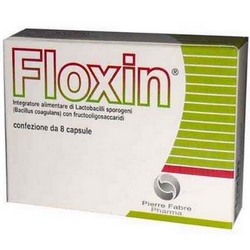Floxin, the brand name for Ofloxacin, is a fluoroquinolone antibiotic effective against a wide range of bacterial infections. It is commonly used to treat respiratory tract infections, urinary tract infections, skin infections, and certain sexually transmitted infections. Floxin works by inhibiting bacterial DNA replication, leading to the death of the bacteria. Available in oral and topical forms, Floxin is versatile in treating both systemic and localized infections. While generally well-tolerated, common side effects include nausea, dizziness, and headache. Rarely, it may cause tendonitis or tendon rupture, particularly in older adults. Floxin should be taken exactly as prescribed, and it’s important to complete the entire course of treatment to ensure the infection is fully eradicated and to prevent the development of antibiotic-resistant bacteria.


Floxin’s broad-spectrum efficacy makes it a reliable choice for treating various bacterial infections, from respiratory and urinary tract infections to skin and soft tissue infections. Its ability to target both Gram-positive and Gram-negative bacteria ensures comprehensive treatment, making it a preferred option for infections where the causative agent may not be immediately known or in mixed bacterial infections.

Floxin is available in both oral and topical forms, providing versatility in treatment. This allows healthcare providers to choose the most appropriate method of administration based on the type and location of the infection. Whether treating a systemic infection with oral tablets or a localized infection with topical application, Floxin’s flexibility ensures effective treatment tailored to the patient’s needs.

Floxin is known for its high bioavailability, meaning that a significant portion of the drug reaches the bloodstream when taken orally. This ensures rapid and effective treatment, making Floxin an efficient option for combating bacterial infections. High bioavailability also means lower doses can be used to achieve the desired therapeutic effect, potentially reducing the risk of side effects and improving patient compliance.
Reasons to Use Floxin
Floxin – Product Description
Overview:
Floxin (Ofloxacin) is a potent antibiotic from the fluoroquinolone class, used to treat a broad range of bacterial infections. It effectively targets both Gram-positive and Gram-negative bacteria, making it versatile in treating respiratory, urinary, skin, and sexually transmitted infections. Floxin works by inhibiting the replication of bacterial DNA, leading to the death of the bacteria. Available in oral and topical forms, Floxin offers flexibility in treatment. Common side effects include nausea, dizziness, and headache, while rare but serious side effects like tendonitis and tendon rupture may occur, especially in older patients. It is essential to take Floxin exactly as prescribed and to complete the full course of treatment to prevent the infection from returning and to avoid the development of antibiotic resistance.
Indications:
Floxin is indicated for the treatment of various bacterial infections, including respiratory tract infections (such as bronchitis and pneumonia), urinary tract infections, skin and soft tissue infections, and sexually transmitted infections like gonorrhea. It is also used to treat certain types of otitis media and prostatitis. Floxin’s broad-spectrum activity against both Gram-positive and Gram-negative bacteria makes it particularly useful in treating mixed infections or when the specific bacteria causing the infection are not immediately known. Due to its efficacy and versatility, Floxin is a go-to option for treating infections in different parts of the body.
How to Use:
Floxin should be taken exactly as prescribed by a healthcare provider. The oral form is typically taken with or without food, and the dosage depends on the type and severity of the infection. Patients should drink plenty of fluids while taking Floxin to help prevent some potential side effects, such as crystalluria. The topical form should be applied as directed to the affected area. It is crucial to complete the entire prescribed course, even if symptoms improve before the medication is finished, to ensure the infection is fully eradicated. Skipping doses or stopping the medication early can lead to treatment failure and the development of resistant bacteria.
Advantages:
Floxin offers several advantages, including its broad-spectrum activity against a wide variety of bacterial infections. Its high bioavailability ensures effective treatment with lower doses, which can reduce side effects and improve patient adherence to the treatment regimen. The availability of both oral and topical forms provides flexibility in treating different types of infections, whether they are systemic or localized. Additionally, Floxin’s ability to rapidly achieve therapeutic levels in the bloodstream makes it a reliable and efficient choice for treating infections promptly and effectively.
Conclusion:
Floxin (Ofloxacin) is a highly effective fluoroquinolone antibiotic widely used to treat a range of bacterial infections. Its broad-spectrum activity, coupled with high bioavailability and versatile forms of administration, makes it a reliable choice for healthcare providers. While generally well-tolerated, it is important for patients to follow their prescribed treatment regimen closely to ensure successful outcomes and to prevent the development of resistance. Despite potential side effects, such as tendonitis, Floxin remains a critical option in the treatment of bacterial infections, particularly when other antibiotics may not be effective.
Composition:
Floxin contains Ofloxacin as its active ingredient, a fluoroquinolone antibiotic known for its broad-spectrum activity. Inactive ingredients in the oral tablet form may include substances like microcrystalline cellulose, magnesium stearate, and silicon dioxide, which help to maintain the tablet’s stability and efficacy. The formulation is designed to ensure that the active ingredient is effectively absorbed into the bloodstream, providing rapid and reliable treatment of bacterial infections.
Note:
Patients taking Floxin should be aware of the potential for side effects, including nausea, dizziness, and, rarely, tendonitis or tendon rupture, particularly in older adults or those on corticosteroids. It is important to avoid unnecessary sun exposure or use sunscreen, as Floxin can increase sensitivity to sunlight. Patients should also inform their healthcare provider of any other medications they are taking, as Floxin can interact with certain drugs, potentially leading to adverse effects. Pregnant or breastfeeding women should consult their healthcare provider before using this medication. Completing the full course of Floxin is essential to prevent the development of antibiotic resistance and ensure the infection is fully treated.
Floxin: Powerful Antibiotic for a Broad Range of Bacterial Infections
In this informative video, we explore Floxin.
Why us?

Authenticity Guaranteed:
We ensure that every batch of Floxin is sourced from trusted manufacturers, providing you with genuine medication that meets the highest quality standards.

Competitive Pricing:
Our pricing is designed to make essential medications like Floxin accessible to all, offering competitive rates and frequent discounts to help you manage your health affordably.

Reliable Customer Support:
Our dedicated team is available to assist with any questions or concerns you may have about purchasing and using Floxin, ensuring a smooth and confident buying experience.



